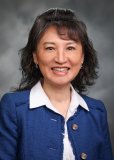Faculty Co-Publish Article on Microlearning Strategies in NP Education
Carolina Tennyson, assistant professor, Benjamin Smallheer, associate professor, and Jennie De Gagne, professor, co-produced "Microlearning Strategies in Nurse Practitioner Education" in "Nurse Educator."


 Carolina Tennyson, assistant professor, Benjamin Smallheer, associate professor, and Jennie De Gagne, professor, co-produced "Microlearning Strategies in Nurse Practitioner Education" in "Nurse Educator."
Carolina Tennyson, assistant professor, Benjamin Smallheer, associate professor, and Jennie De Gagne, professor, co-produced "Microlearning Strategies in Nurse Practitioner Education" in "Nurse Educator."
Excerpt
Microlearning is the acquisition of knowledge from short, focused modules of information, generally involving a single learning objective. This strategy allows content to be consumed in a short period and in a convenient manner. Microlearning has become increasingly popular in many industries as adult learners prefer shorter, more informal content methods such as podcasts, daily emails, and blogs. Microlearning is inextricably linked to technology; for example, a smart phone application can provide direct access to mobile, convenient education in flexible formats. Microlearning has been lauded as a unique way to provide effective education for distanced students and adult learners who are juggling multiple responsibilities and have limited time for learning. Self-directed learners can control the time, place, and pace of their microlearning and is therefore extremely flexible.
Buchem and Hamelmann described microlearning as “dynamic” and microlearners as “prosumers of content, building [their] own mental structures through exploration and social interaction.” Microlearning is posited as an inherently social learning experience in which learners actively participate in the pursuit of understanding and the production of knowledge. As such, learners are expected to be active in the learning process, engage with the content and with others, seek out new mental connections, and repurpose the material for their own needs.
In health professions education, microlearning is an engaging option shown to have a positive effect on knowledge retention and learner engagement; yet, there is a paucity of evidence on higher-level outcomes. Moreover, little is known about microlearning among nurse practitioner (NP) students. Nurse practitioner students can benefit from supplemental microlearning material. This article describes microlearning and recommends strategies for faculty to create microlearning content and integrate it effectively into NP education.